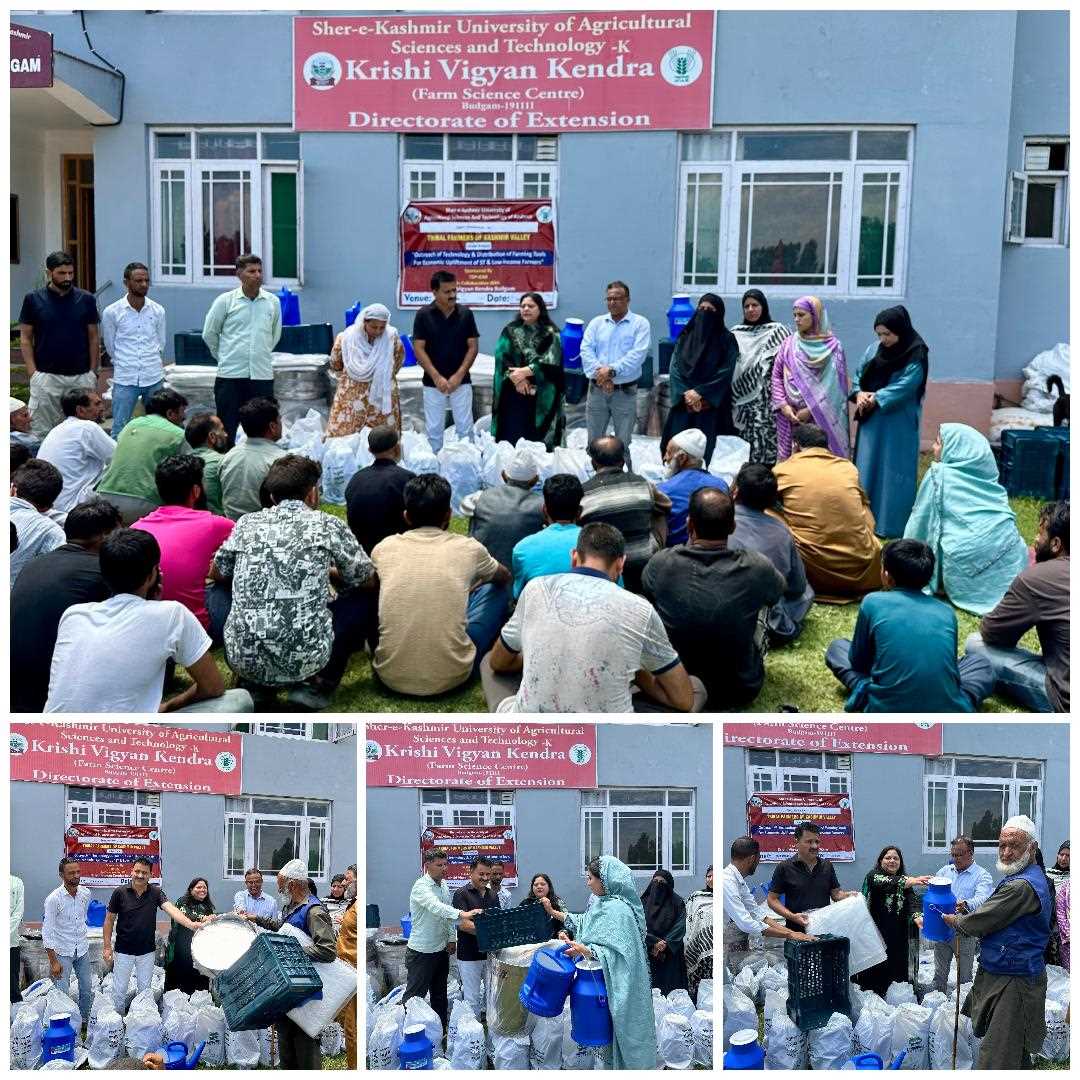
In an initiative to uplift tribal farming communities, KVK Budgam, under the leadership of Vice Chancellor, SKUAST-K, Prof. Nazir Ahmad Ganai organized an Input distribution programme today under the ICAR-Tribal Sub Plan (TSP) under project ‘Outreach of technology & distribution of farming tools for economic upliftment of ST and low income farmers.’
The programme aimed at empowering tribal farmers through the provision of vital agricultural inputs.
The event was chaired by Prof. (Dr.) Raihana Habib Kanth, Director Extension, SKUAST-K, as the chief guest, who led the distribution and interacted with the beneficiary farmers.
Speaking on the occasion, Prof. (Dr.) Raihana emphasized the importance of continued handholding and field-level demonstrations to ensure optimal utilization of inputs and long-term impact on productivity thus improving the socio-economic conditions of tribals by providing timely support and introducing need-based technological interventions.
She stressed the importance of adopting scientific practices for achieving sustainable agricultural growth and improving rural livelihoods.
Prof. & Head KVK Pulwama (PI of the project), Prof. Javeed Ahmad Mugloo in his address highlighted the objectives of the Tribal Sub Plan, emphasizing the commitment of ICAR and SKUAST-Kashmir towards improving the livelihoods of tribal farming communities through location-specific technologies, capacity building and input support . He urged farmers to adopt scientific farming practices and make the best use of the inputs provided.
Prof. & Head KVK Budgam, Dr. Bilal Ahmad Lone highlighted the objectives of the ICAR-TSP initiative focusing on holistic development of tribal farmers through input support, skill development and technological empowerment.
During the programme, inputs were distributed among identified tribal beneficiaries of Shuplain, Nowgham villages of block Khag. The inputs are expected to support better crop productivity and sustainable farming practices in the district.
In an initiative to uplift tribal farming communities, KVK Budgam, under the leadership of Vice Chancellor, SKUAST-K, Prof. Nazir Ahmad Ganai organized an Input distribution programme today under the ICAR-Tribal Sub Plan (TSP) under project ‘Outreach of technology & distribution of farming tools for economic upliftment of ST and low income farmers.’
The programme aimed at empowering tribal farmers through the provision of vital agricultural inputs.
The event was chaired by Prof. (Dr.) Raihana Habib Kanth, Director Extension, SKUAST-K, as the chief guest, who led the distribution and interacted with the beneficiary farmers.
Speaking on the occasion, Prof. (Dr.) Raihana emphasized the importance of continued handholding and field-level demonstrations to ensure optimal utilization of inputs and long-term impact on productivity thus improving the socio-economic conditions of tribals by providing timely support and introducing need-based technological interventions.
She stressed the importance of adopting scientific practices for achieving sustainable agricultural growth and improving rural livelihoods.
Prof. & Head KVK Pulwama (PI of the project), Prof. Javeed Ahmad Mugloo in his address highlighted the objectives of the Tribal Sub Plan, emphasizing the commitment of ICAR and SKUAST-Kashmir towards improving the livelihoods of tribal farming communities through location-specific technologies, capacity building and input support . He urged farmers to adopt scientific farming practices and make the best use of the inputs provided.
Prof. & Head KVK Budgam, Dr. Bilal Ahmad Lone highlighted the objectives of the ICAR-TSP initiative focusing on holistic development of tribal farmers through input support, skill development and technological empowerment.
During the programme, inputs were distributed among identified tribal beneficiaries of Shuplain, Nowgham villages of block Khag. The inputs are expected to support better crop productivity and sustainable farming practices in the district.
© Copyright 2023 brighterkashmir.com All Rights Reserved. Quantum Technologies